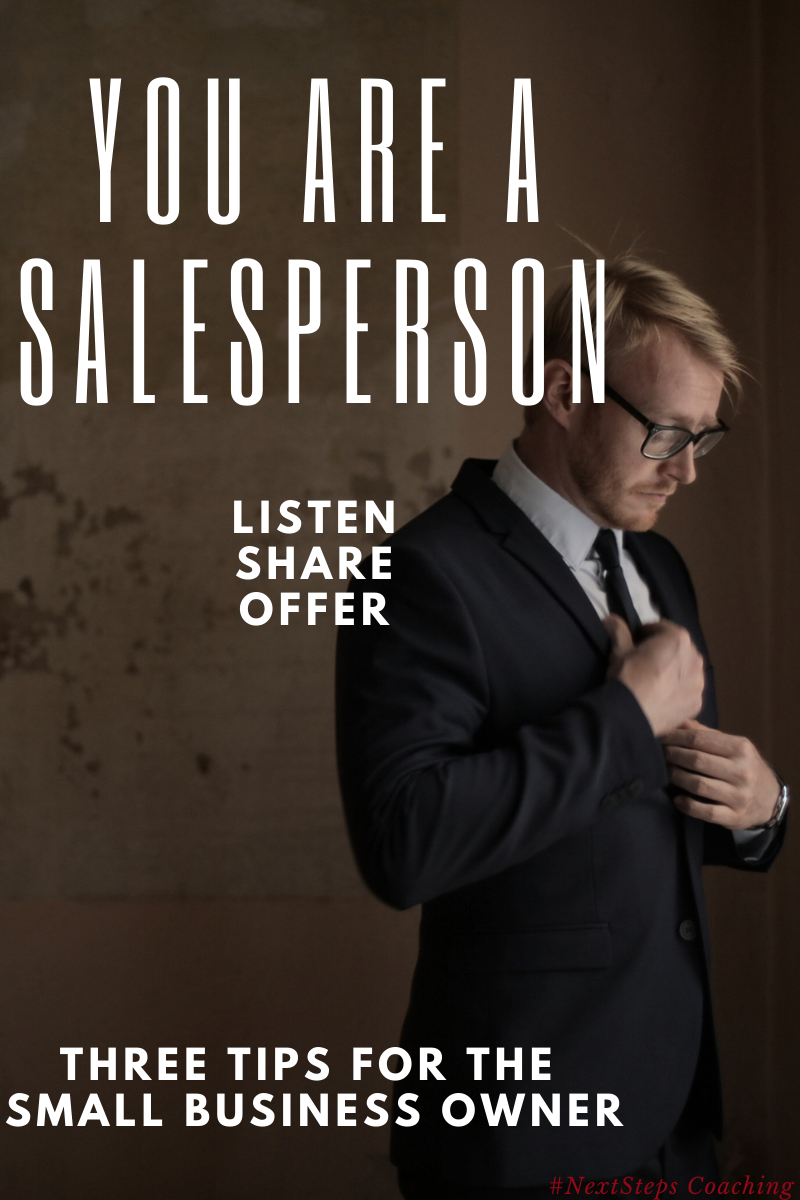
One of the biggest shifts I see young entrepreneurs and business owners need to make is in their belief in understanding that they are a salesperson.
They might be visionaries, great leaders, product developers, weekend grinders, but they are not (at least in their belief) a sales person.
Guess what: if you don’t sell your product, no one is going to buy it!
Sales is what your company does to make a person give you money for a product they want … The sales process requires a complete knowledge of the product that the company is offering, and needs to be defined by the service standards and criteria that the company has set.*
The Death of a Salesman
I’ve shared on the blog before the early explosion of my coaching practice. In short, I saw quick growth in a short amount of time. Within the first year of coaching I had exceeded my regular income.
I let it go to my head.
I stopped marketing, stopped networking, and stopped advertising (all things we’ll look at in the next post of this series).
The result was inevitable: I also stopped selling. As I finished up with my clients, I had no pipeline to refill, no prospects to call, and no income to replace what was lost. By the end of my second year, I was down to one regular client.
I failed to follow my own advice and never once told myself, “You are a salesman.” I didn’t want to sell myself, my products, or my services. And so I sold nothing.
I found broke.
That led to being miserable. 
Eventually, I vowed to change.
Listen. Share. Offer.
Recently, I was at the dentist getting my teeth cleaned. It was my first trip to this dentist, and we were making the usual awkward small talk while he dug around my mouth.
Inevitably, he asked me what I did for a living.
I work with small business owners like yourself focus on getting the right things done to maximize their business and personal lives through executive coaching and HR solutions.
It’s a question I’ve answered a thousand different times. I play with the wording depending on the situation to make sure it has maximum impact.
He sat quiet for a second. Pull away from my gaping mouth, scribbled something on the notes, and went back to work.
Now, I don’t know if he wrote a note to call me later to talk business, but I do know he spend a good portion of the rest of the time talking about how busy he was and how hard it can be to get everything done. At the very least, I’d touched a nerve that made him aware of how I could help.
Most of the time, my answer follows three easy steps to help me know how to talk to the other person, initiate low-pressure sales, and move the conversation forward.
Listen
First, I start with listening. I know how to shape a conversation and usually get to ask what the other person does for a living first. This time, I already knew (dentist), and had to guess at what some of his pain points might be.
But the important thing is to start with listening. Open your ears. Shut your mouth. Let the other person describe themselves, problems, hopes, dreams, fears, and family. You’ll learn quite a bit and have a good platform to engage them from.
Share
Find a way to share about yourself. Your family, your own hopes, dreams, fears, and wild goals. Then share what you do, and if applicable, find a way to share how it could help them.
Above, I offered this, because I know what it’s like being a businness owner and having a wide range of needs on a day to day basis. He ended up telling me quite a bit about his struggle in balancing work and family, kids, grandkids, employees, and medical records. We have similar pain points and struggles. I knew I could help.
*It’s also worth noting that sometimes you may not be able to help a person. In these situations, don’t force your product unnecessarily and don’t assume they aren’t a worthwhile contact to have. Just because you can’t solve their problem doesn’t mean you can’t solve their siblings, parents, friends, or neighbors.*
Offer
The final step is to offer your services. Sometimes this happens right away, especially if I feel like I stand a good chance at closing. I tried this recently and closed a great deal for early next year.
Sometimes, it’s an offer to follow up. Networking events can be difficult to engage in deep-level business talks. Schedule a coffee or offer to come by their office.
Othertimes, it’s also a chance to keep the door open. The time may not be right, but they might know someone. I have a list of people that I will probably never do business with (for a variety of reasons). With them, I keep in touch every couple of months to check in, start a conversation, and see what’s changed. I may not get their business but I may just get business from someone they know.
Offering to stay in touch is a salesperson gold mine.
As business owners, we are the visionaries. We believe in our product more than anyone. That makes us the chief salesperson in our organization, whether we run a show that is just us, of a team of 100 people building a thriving business.
No matter your work.
No matter your product.
As a business owner you are a salesperson.
Eight Core Concepts
This list is updated as the blog series continues. Click on any live link to go to that post in the series. 
* Whitney, Marcus. Create and Orchestrate: The Path to Claiming Your Creative Power from an Unlikely Entrepreneur (p. 88). Creative Power. Kindle Edition.